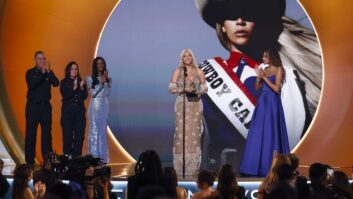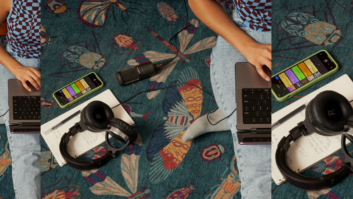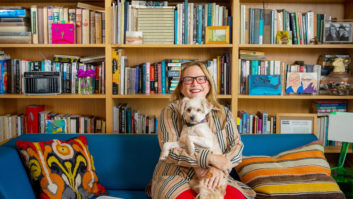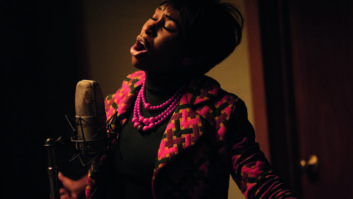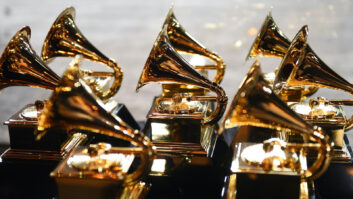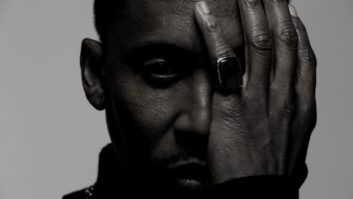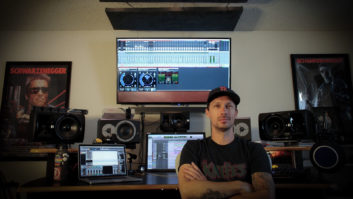Raphael Saadiq is laughing, recounting a story to his studio mates. Earlier that week, he had flown to Los Angeles to work on some vocals for his debut solo project and walked up to the rental car counter. He gave the woman behind the counter his driver’s license and credit card. She looked it over, studying it carefully. She said, “I know your name from somewhere.” Trying to quicken the transaction, he answered, “Yeah, I was in Tony! Toni! Toné! and Lucy Pearl.” “No,” she responded, “that’s not it.” An awkward silence followed until she placed it. “The Isley Brothers! You worked with the Isley Brothers.” Turns out she had seen his name on a commercial for the Isley Brothers’ latest, Eternal.
That small interaction speaks volumes for the status of Raphael Saadiq, who blossomed into a recording star with Tony! Toni! Toné! before fronting the all-star outfit Lucy Pearl. Even as he works on his solo album, Saadiq has been busy producing artists such as TLC, Macy Gray, the Bee Gees, Snoop Dogg, D’Angelo, Ginuwine, Bilal, Whitney Houston and Toshi Kubota. While he’s dabbled in producing since his days with Tony! Toni! Toné!, Saadiq’s producing credits have grown exponentially since the demise of Lucy Pearl.
How do you prepare to go into these sessions, because these are jobs where you’re not the main producer?
The only projects I did as a whole were the Tonys’ and my solo album. The way the industry is going now, people smorgasbord it a little bit and get the pick of the day. You end up doing two or three songs, and, as time progresses, you end up doing whole albums. I don’t really like doing whole albums, unless it’s my group. But for the learning experience of it and working with other artists, it’s fun. It’s always fun. I like not being the main producer and then coming into somebody’s record, coming off the bench to get a hit.
When you go into a session, do you have definite ideas about where the song should go?
I have an idea about the person I’m working with, and I can hear where it should go. But it’s definitely trial-and-error.
Do you go back and listen to somebody’s past work?
For the Isleys, you can’t help but think about what they did. I grew up listening to them. For the Isley Brothers, I specifically was told to do a track like “Who’s That Lady.” The song is called “Move Your Body.” So, I specifically did a track like that same era; nothing updated. I raised the bar a little bit with technology, but not much. I used the same instrumentation: It was hardcore bass, guitar, and drums and distorted guitars. When you’ve got someone like Ernie and Ronnie [Isley] around, that’s the biggest piece of the puzzle. I didn’t have to go and listen to those records, because I know what the Isley Brothers sound like.
Everybody else? Some people are looking for different sounds and new sounds, and that’s when you get a chance to raise the bar and grow and try different things.
What sort of things are you called for?
I get called for more of a soulful sound and commercial radio songs. I guess people I work with expect me to fuse the two, where you can be artful and, at the same time, be credible. That’s the marriage that I try to put together.
The Bilal song “Soul Sista” is very soulful.
That’s a soul song that is credible, and people like it in a commercial world also. That’s the kind of thing I try to do and, more or less, I like to do. I’m glad that it’s appreciated. It’s not that I put a lot into it; there’s nothing to that song, really. I was surprised that they even picked it in 2001, because that’s what I grew up listening to, but I try to raise it up a notch. The music that I grew up listening to was old when I started making records, but it’s the best. It will always be the best.
How have you approached the different facets of your career — the time with Tony! Toni! Toné!, Lucy Pearl, the solo album and writing songs for other artists?
I’m not the same person I was when I was with the Tonys. If you are, then that could be a problem. I think with the Tonys, I was more or less that kid who idolized a lot of people growing up who were from the same areas that I grew up in. I think I approached it more as a band playing in clubs. Before that, it was playing more blues and slum churches. I like real traditional slum churches, like where Sam Cooke and Bobby “Blue” Bland would have played. I played with men who sing like that. When I got into bands, I had the drive from the older men who I was playing around with when I was a kid. So, I had the drive to push a lead singer further.
When I got in bands, I did the same thing — I wasn’t the lead singer; I was the bass player who sang backgrounds, so I was always pushing bands. When I was in Tony! Toni! Toné! with my brother, I was more of a pusher, a supporter, and I’ve always played that role. If Hendrix was around, I’d be the bass player, I felt like. All my friends used to tell me, “You should go out and start singing. You should lead sing.” But I understand my personality; my personality is always to help because my father is like that. You can’t shake those things.
As far as producing, I have a relaxed approach. I didn’t take advantage of it [for a long time]. After Lucy Pearl, I took advantage of it and made a lot of money in three months and said, “Wow, this isn’t bad.” Then I started producing and producing and producing. Now I almost treat ’em as an equal. First it was: “I have to make records for myself and perform, then produce a little bit.” But the person I am now is more into producing; I’ve grown to like it. I like the technology of it. I’m more into the technology and keeping the meat and potatoes, which is my bass and my guitar, than doing some strings and orchestra. Scoring is a big thing that I really want to get into one day. So, every day I’m looking at dimensions of studios and trying to build a new studio. How much it would cost me to do this, what kind of debt I’m going to get into, how can I win being a producer? I’m all into that.
As far as technology goes, what are some of your favorite pieces of gear?
I’m definitely using Pro Tools like everybody else. I’m Pro Tools-driven, but I still like to go to tape; I still like the warm sound. I don’t think people give a shit just walking down the street. I can tell, but it took me almost eight or nine years to be able to tell. I think in those eight or nine years, there’s probably been millions of digital and analog records out that are huge. But it’s been convenient for me, because I come up with so many ideas and I can go to the next one without changing a reel. My mind works really fast, and I’m always hopping to the next thing. I’ll be playing guitar and I’ll get bored with something, so I’ll say, “Okay, pull up a new file.” I don’t get mad when access has been denied. I just sit back and play until it works out. Technology did that for me, and covering all my sessions, shooting them with film. Everything I do I shoot with film. I’m surprised I’m not filming you right now. [Laughs.]
Did you go through a big learning curve as far as picking up Pro Tools and playing with that stuff?
Yeah, I’ve been working with it for almost 10 years. I never actually sat down and pulled up files myself until this year. I’ve been looking at the screen while other people have been doing it, but now I can move vocals around. It’s fun, I like it. It’s like a game to me. I like PlayStation 2, Dreamcast, so it’s all like a game to me. I don’t take it too seriously.
How about other tools?
I like the PC-80, the Trident and the Nord Lead keyboards. The ASR [keyboard] is always going to be a dirty, little, funky thing. I think the more you have, like old Prophet 5s and Oberheims, the more you can keep the listeners thinking.
As a musician, was going from bass to guitar to keyboard a way for you to learn more about music and become a musician in a pure sense?
Well, I grew up playing bass and I was around a lot of musicians. I played trombone in junior high, and I was first trombone player in jazz band. I was taking classes at UC Berkeley’s young musician’s program. So, that was always in me, to be a musician, to be able to compete at the Oakland level, the San Francisco level; wherever you go, you can play. Except I don’t think I made it to the fusion clubs. [Laughs.] I think I left that out.
But I always wanted to be a musician. When I got my hands on something, I tried to master it. Bass and guitar were the two things that I stuck with, more bass than guitar. Now I’m playing more bass. I write more. I was fortunate to have a lot of great guitar players around me, and I steal everything that they do; they slow it down and show it to me. Technology is the same way; people slow down and show it to me, and I soak it up.
Do you feel it’s important to be book-smart about music?
I think there are strengths and weaknesses in it. To be book-driven, you can have the advantage of scoring or writing charts. It’s something I didn’t get all the way into, so I guess I didn’t get that book-smart. But I could write out a chart when I was doing it. Now, if I could go back and brush up a little bit, I know I could do it. But, I was also so free-spirited with the bass and playing. Before I went to UC Berkeley, I took bass lessons at Music Unlimited in Oakland, and that was just discipline. Nobody made me do that; I really wanted to do it. I think it helps to have both, and I think it’s better to start out not reading and then figure out that you want to read. I’m not a fluent reader now, but I think like a composer. I can walk into an orchestra and tell them what’s wrong and go to a piano and play it. I think it has its advantages and disadvantages. I can read charts, I can read notes, so it’s fun both ways. It’s fun going into a club in Chicago and being able to get on your guitar and play some B-flat blues. So, I think you want to have both, but you have to really strategically plan how not to make one make you not want to do the other.
Looking over your credits, it would seem like going from the Bee Gees to Snoop Dogg would be a bit of a stretch. How do you get your head around those different dates?
I’m a melody-driven person, and people like Snoop, even though they rap, are melody-driven people, too. When I work with somebody like the Bee Gees, they are full of melody. I don’t think the gap is that much different, because those guys that rap well really hear melody, but they just rap to it. I like spreading myself like that, from the Bee Gees to Babyface to TLC to country music. That’s one thing I haven’t done that I want to do. And ska.
Is it on the horizon?
It just sounds fun to me. Ska bands will always be around. I just like playing with good musicians. Like I say, I’m a supporter. So I can play with them. I like Spanish music a lot. I like traditional Mexican music. If you ever listen to the bass on some of those songs, it’s close to reggae-sounding. And the horn section? Like the Cuban horn sections? Carlos Santana turned me on to a lot of the Cuban horn players.
And country? What’s the attraction? The emotion?
Nah, I don’t think it’s that. I just like the constant strum. I like that constant turnaround that the bass does, because early gospel was sort of the same. The Soul Stirrers and Charlie Pride were almost the same, just more with a southern twang on it. It just seems real peaceful and sunny. Sometimes they get down, but most of the time, if you go to Nashville, it’s sunny and there’s big trucks and people got a lot of land. I’m into that. I like that kind of freedom and peace.
As a producer, songwriter and burgeoning solo artist, do you keep an eye on current music?
I don’t have a real big concern about it, because I do it naturally. Thank God I don’t have to make an effort to make a radio song. So I think I bridge between artistic and credible and radio-friendly. I do it naturally, without giving away the music.
What kind of feeling was it when D’Angelo’s song “Untitled” won the Grammy?
Well, it was his Grammy, and I don’t really view the Grammys like [I won it]. I don’t want to say it doesn’t mean anything. I think it’s a great thing to win a Grammy; I would like to have nine of them. But at the same time, Britney Spears could win a Grammy, too. Not that she doesn’t deserve it, because she’s worked hard just like the next person. [But] if you’re the flavor of the month, you can have one. So, I don’t really get excited about Grammys. I was excited about it getting nominated. It’s all a game and I’m playing the game. That D’Angelo and I were able to collaborate and come up with something as a team that the world likes and to help somebody’s career — that’s my Grammy.
David John Farinella is a San Francisco Bay Area-based freelance writer and a frequent contributor to Mix.
